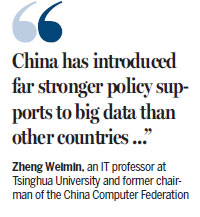
China should pounce at the strategic opportunity to gain a leading position, says Premier
Wang Xiangcheng, a chief technologist at Shandong-based Inspur Group Co Ltd, has devoted 40 percent of his work time to Guiyang, the capital of Southwest China's Guizhou province, more than 1,800 km away from his company headquarters. He is helping local officials leverage big-data technology on poverty alleviation.
Since December, Inspur, the country's largest server manufacturer, has been working on a big-data platform, designed to regularly pool and update information about locals living below the poverty line, and help Guizhou officials aid poverty-stricken families in innovative ways.
"Currently, the platform is keeping track of 6.23 million low-income people's personal information, such as educational background, occupation, and income," said Wang, who is in charge of Inspur's big-data poverty alleviation department.
By following and analyzing the data, officials can zone in on the kind of subsidies and assistance people in poverty need, and offer more precise and targeted help, Wang said.
Inspur and Guizhou's efforts are part of a big-data boom sweeping across China as the country is initiating moves to upgrade enterprises and governments with information technology.
The favorable policy environment is encouraging companies to bring cutting-edge technology into areas ranging from manufacturing, food delivery, and medicine to government affairs, analysts said.
Last month, Premier Li Keqiang said at the China Big Data Industry Summit that big data and cloud computing have penetrated every aspect of human production and daily lives.
"The new generation of technology puts all countries at the same starting line. China should pounce at the strategic opportunity to gain a leading position," Li said.
To achieve that, it is important to cultivate both new and traditional industries. By incorporating new technologies, such as big data, into production, enterprises can offer better products and services, Li added.
Zheng Weimin, an IT professor at Tsinghua University, said China has an edge in developing big data, a technology that is only possible when a huge amount of data is accessible online.
"China, as the world's second-largest economy, generates and processes a vast amount of data every day. More importantly, the country's internet boom has put most of such data online, which has laid down a solid foundation," said Zheng, former chairman of the China Computer Federation.
Also, compared with other tech sectors which have long been dominated by foreign enterprises, the big-data industry chiefly relies on open-source software, which gives every country free and equal access to state-of-art technology.
"China has introduced far stronger policy supports to big data than other countries, which are galvanizing both enterprises and local governments into quick action," he added.
To facilitate companies unlocking the potential of big data, Premier Li also promised last month to release more government information, except that concerning areas such as national security and sensitive business.
"The government controls roughly 80 percent of data and information generated in China. If enterprises can access this data which, of course, first needs to be scrubbed to remove personal references, it will spark a new round of innovation and create a level playing field for all companies," said Zhang Xu, a researcher at Beijing-based internet consultancy Analysys International.
If, for instance, the China Meteorological Administration can share more real-time and region-specific weather information, food delivery companies can leverage big data to predict which food is most popular when a city is hit by a heavy rain at 30 degrees Celsius, Zhang said.
But so far, big data is still in its infancy, and many companies are trying to figure out how to link it with their core businesses, analysts said.
Mei Hong, vice-president of Shanghai Jiao Tong University, said many just use the technology to count and accumulate data. Some focus on trend analysis.
"Few apply big data to predict what is likely to happen, make decisions and evaluate possible consequences," Mei said.
Still, entrepreneurs are eager to enter the sector, which they believe will be an important engine of China's economic growth.
Wang Jun, former CEO of Beijing Genomics Institute, one of the world's largest genome sequencers, believes the era of big data is coming. He set up a big-data based healthcare company, iCarboX, last year.
The mission is straightforward: leveraging big data technology to offer precision medicine or personalized healthcare services.
"Big data is the future and we can't miss it," Wang said.
Contact the writers at masi@chinadaily.com.cn



(China Daily 06/07/2016 page7)